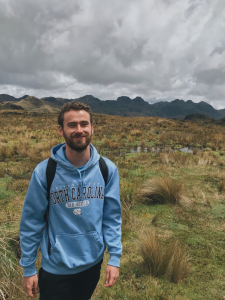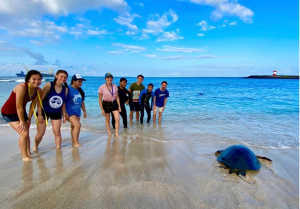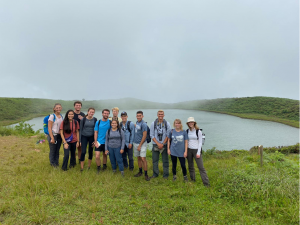Hear Carson Mays, UNC Chapel Hill ’21 graduate, explain how studying abroad in Ecuador and specifically the Galapagos changed his perspective for the better.

After 2 1/2 years studying Environmental Science at UNC, I was growing a bit fatigued. I had fallen into a pretty rigid routine and wanted an immersive experience to provide me with field work experience and global perspectives that could not be found in my typical classroom setting. I needed something new, something different. Knowing very little about the Galapagos Islands other than its unequivocal beauty and environmental richness, I applied to study abroad in Ecuador – both the mainland and Galapagos – for the Spring of my Junior Year. Little did I know that this opportunity would be the highlight of my college years.

The first month of my semester abroad was in the mainland of Ecuador, at Universidad San Francisco de Quito (USFQ). I lived with an incredible host family and commuted to school via city bus. The program involved taking one class at a time, which really allowed me to immerse myself in the subject matter of the class. This immersion was enhanced by regular field trips to areas around Quito. My peers and I took advantage of weekends to take trips and explore small towns around Ecuador. One weekend was spent in the town of Mindo, a small town in the cloud forests of the Andes. We hiked, swam in mountain streams, went tubing in a local river, and taste-tested Ecuadorian chocolate. Another weekend was spent in Baños, a town situated in a valley and surrounded by beautiful volcanoes. Baños had outdoor activities, such as hiking and canyoning, but was a bigger town than Mindo, so we were also able to spend some of the weekend exploring the city streets. Overall, everyone in the program quickly became friends and it was so nice to share these adventures with others.

At the beginning of the second month, my program moved from Quito to the Galapagos Islands, where I was meant to take my next three classes. Life in the Galapagos was such a contrast from Quito. Commutes to school transitioned from crowded buses to a casual bike ride. After school activities went from shopping and sightseeing to snorkeling and hiking. Field trips went from bus rides to farms and learning about sustainable agriculture to boat rides to neighboring islands and seeing incredible wildlife. Adjusting to a new way of life and a new host family was a bit difficult at first, but in the end, life in the Galapagos was equally as magical to life in Quito. The main town on the island of San Cristobal, Puerto Baquerizo Moreno, was small and quaint. In no time, I was able to learn my way around to any shop or restaurant and even start recognizing locals when I passed them on the street. Unlike Quito, the appeal of the Galapagos was not the thriving urban life, but rather everything that surrounded the small town. The USFQ building in the Galapagos was on the outskirts of town in front of a charming little beach called Playa Mann, which was home to sea lions, marine iguanas, crabs, and some of the many unique birds of the Galapagos, including the Blue-Footed Booby. When I wasn’t in class I volunteered with the UNC/USFQ Galapagos Science Center, which was free for all UNC students. I collected and sorted plastic pollution and helped photograph and monitor sea turtle populations in the ocean. On the weekends, most of my free time was spent exploring beaches around town and hiking on the trails that surround the town.

Unfortunately, the pandemic cut my time in Ecuador short and I was forced back home to finish my semester with online classes. Even online, my final classes from abroad challenged me to think differently about my studies and truly taught me the value of seeking perspectives from beyond the confines of my everyday life. Not to mention, the shared experiences I had with my peers in Ecuador gave me friendships that I will have for years to come.
